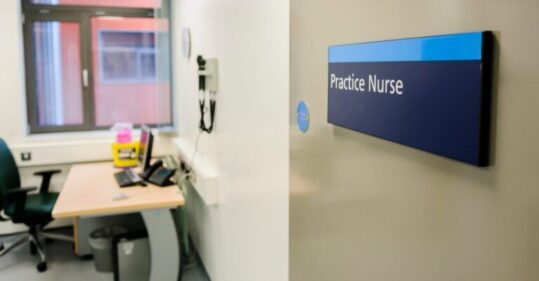International Nurses Day: GPNs ‘still pushing’ to show they are ‘very competent’

Exclusive: To mark International Nurses Day this weekend, Nursing in Practice has spoken with general practice nurses (GPNs) to discuss this year’s theme which centres on the ‘economic power of care’.
The economic value of general practice nursing is often overlooked and the profession is not always seen as the ‘safety critical’ role that it is, Nursing in Practice has been told.
GPNs have said they are still working to ‘push the agenda’ to show their competence and skills, and in some cases feel under-recognised for the jobs they do.
The International Council of Nurses (ICN), which organises the annual celebration on May 12, said this year’s theme of the ‘economic power of care’ seeks to shine a light on the ‘immense economic and societal contributions’ made by nurses across the globe.
Value of GPNs ‘not recognised’
For Ellen Nicholson, national safety and learning lead at NHS Resolution, the economic value of general practice nursing is often overlooked and sometimes isn’t even considered.
Ms Nicholson, who is a GPN by background, explained how conversations around general practice nursing regularly do not recognise the skills that nurses have, and the ‘safety critical and professional’ work that nurses do daily.
‘When people talk about nurses… they call nurses “caring” and focus on their soft skills,’ she told Nursing in Practice.
‘But to be a medical professional [or] to be an allied health professional, you have to be caring too, it’s not something specific to nursing.’
Related Article: NHS 10-year plan: What does it mean for nursing?
Ms Nicholson noted that the ‘academic expertise’ of nurses is also regularly overlooked, leading to perceptions of nurses being ‘stuck in a time warp’.
She said this was worsened by national media presenting nurses as ‘angels’ and not as highly skilled professionals.
The ‘hidden’ skills and ‘expertise’ of nursing, such as working with the elderly, or communicating with people with learning disabilities, often go unacknowledged despite taking years to refine, added Ms Nicholson.
GPNs ‘still having to push the agenda that we’re very competent’
Meanwhile, lead nurse and practice placements facilitator at Newcastle GP Services, Joanna Vintis, agreed that the clinical and advanced skills of nurses are regularly under-recognised.
She explained: ‘It’s very, very worrying as a profession, just because we can assess the emotional and wellbeing needs of a patient, [it shouldn’t] diminish what we know clinically, and we’re often pigeonholed into categories that other professions aren’t.
‘A lot of people don’t realise that most of us have degrees now, lots of us have masters, and we’re still having to push the agenda that we’re very competent.’
Ms Vintis, who trains practice nurses across Newcastle, said she uses these misconceptions as her ‘battle cry’ to show what nursing students can do and the impact they can have every day.
Ms Vintis highlighted the discrepancy between funding for nursing students compared to medical students, as well as the positive impact nursing students can have in GP practices.
She said the education and training tariffs for a nursing student in her area currently stood at £24 a day, compared to £125 for a medical student in GP practices.
‘I’ve had one student do 33 consultations in a day, with 33 blood pressure tests that have identified 10 people with undiagnosed hypertension,’ she said.
‘That’s what one nurse for £24 a day can bring to a practice, impacting 10 people’s lives.’
Ms Vintis explained how ‘practices, rightly, consider the financial implication of hosting students and when this is so weighted towards medical students, nursing students often don’t get a look in’.
She added that supporting all learners equally is important for the ‘sustainability’ of general practice, and to ‘reflect the changes in the landscape in primary care.’
Related Article: Nursing in Practice launches ‘How Nurses Count’ campaign
In addition, Ms Vintis said that undue focus on clinical training within general practice could prevent nurses from accessing leadership roles outside of clinical spaces.
In her case, Ms Vintis said people often assume that she is a prescriber or an advanced practitioner, because she holds a leadership role.
‘I’m in a leadership role because I have a passion for workforce development and supporting people in education and training,’ she said.
‘I think not enough nurses are allowed to see that we should be working outside of clinical spaces. We have so much to bring as people.’
‘The nearer the role is to medicine, the more valued it is’
Dr Helen Anderson, nursing research fellow at The University of York and previously a GPN, argued that ‘the nearer the role is to medicine, the more valued it is’.
‘Whereas additional complex nursing jobs are less valued,’ she told Nursing in Practice.
Through her research work, Dr Anderson has heard from GPNs who feel like they need to train to be advanced clinical practitioners in order ‘to be properly valued and remunerated.’
She said she regularly encountered nurses facing ‘poor pay’ and ‘lack of recognition’ from practice management.
Related Article: ‘Patients not prisoners’: Palliative care nursing behind bars
But some nurses felt ‘underconfident’ or even ‘cheeky’ when trying to claim their economic power and say that they ‘deserve more’.
‘People often say to me it’s not about the pay, it’s about being valued, but we should be appropriately remunerated for the level of work that we do,’ said Dr Anderson.
She added: ‘Often the relationship between nurses and employers in practices means nurses feel like they’ve given their best professional years to a workplace, but they ultimately feel like that’s seen to be of little value.’
Earlier this week, the ICN released a report highlighting the economic benefits of nursing, as well as the need to increase the primary care nursing workforce and the services they provide.

See how our symptom tool can help you make better sense of patient presentations
Click here to search a symptom




